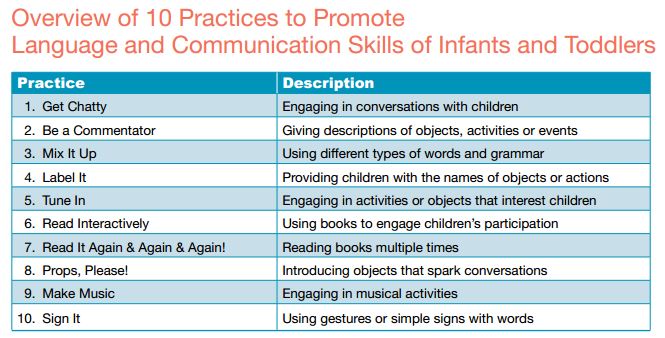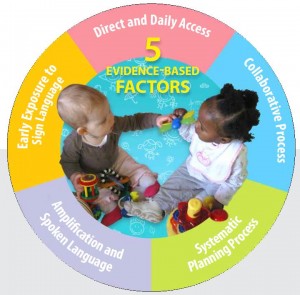Related Products
For Parents
Related Teacher Tools Takeout Items
How to Start to Help your Child
I recently found out my baby has a hearing loss. How can I help him? Where do I start?
First, there are resources available and people to help you. There is much to learn but you are not alone. Children with hearing loss will thrive and develop when their families and other caregivers are aware of the impact of the hearing loss on learning and know what to do to support the baby’s development. You will care for your baby everyday – feeding, playing, bathing – during all of your care activities you can support your child’s language development and learning.
The materials below are just a brief introduction. Contact your local early intervention program (ask your child’s doctor, audiologist or call your school district) to ask about getting help.
One of the most helpful steps parents take is getting in touch with other parents who have learned the strategies for parenting a child with hearing loss and know the emotional ups and downs you may be feeling. Contact Hands & Voices, a parent-driven organization with many resources to support you immediately and in the future. Your state or region may have local a parent support network with people you could meet.
Basic information! Language Unlocks Learning – A 3-page overview of what family’s need to keep in mind if they want to encourage their child to learn language at a rate similar to a child without hearing loss. It can help families identify if they are ‘doing the basics’ to help their child with hearing loss learn and develop. Talk to your early intervention teacher for more in depth information specific to your child.
Checklist: Parent Interview Progress Report – A quick checklist that builds on the ideas presented in Language Unlocks Learning.
 Setting Lang in Motion: Family Supports and Early Intervention for Babies Who Are Deaf or Hard of Hearing. This resource was developed collaboratively between the Clerc Center and the Deaf and Hard of Hearing Program at Boston Children’s Hospital. With this resource, parents, educators, and professionals have free access to seven online modules which share information critical to promoting early language acquisition for young children who are deaf or hard of hearing. The topics covered in these seven modules include: early hearing screening and evaluating, understanding how the ear works, hearing aids, cochlear implants, using sign language for communication, communication at home, and parenting a deaf or hard of hearing child. Find out more here.
Setting Lang in Motion: Family Supports and Early Intervention for Babies Who Are Deaf or Hard of Hearing. This resource was developed collaboratively between the Clerc Center and the Deaf and Hard of Hearing Program at Boston Children’s Hospital. With this resource, parents, educators, and professionals have free access to seven online modules which share information critical to promoting early language acquisition for young children who are deaf or hard of hearing. The topics covered in these seven modules include: early hearing screening and evaluating, understanding how the ear works, hearing aids, cochlear implants, using sign language for communication, communication at home, and parenting a deaf or hard of hearing child. Find out more here.
 Early Intervention Network: Supporting Linguistic Competence for Children Who are Deaf or Hard of Hearing
Early Intervention Network: Supporting Linguistic Competence for Children Who are Deaf or Hard of Hearing
This free online network is designed especially for early intervention professionals. It provides one centralized place to access evidence and recommendations to guide your practice in supporting language and communication development for young children who are deaf or hard of hearing. The network also provides an opportunity to see what early intervention providers are doing to implement these recommended practices.
Visit the network and find out about the 5 evidence-based factors identified as critical to early language acquisition.
Gain the knowledge and skills you need to effectively promote linguistic development for young children who are deaf and hard of hearing.
Materials developed at the Franklin Porter Graham Child Development Institute: http://mtbt.fpg.unc.edu/more-baby-talk Download 10 Ways to Promote the Language & Communication in

